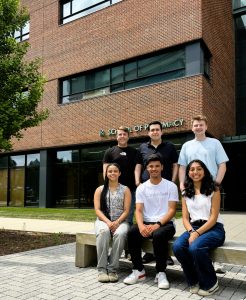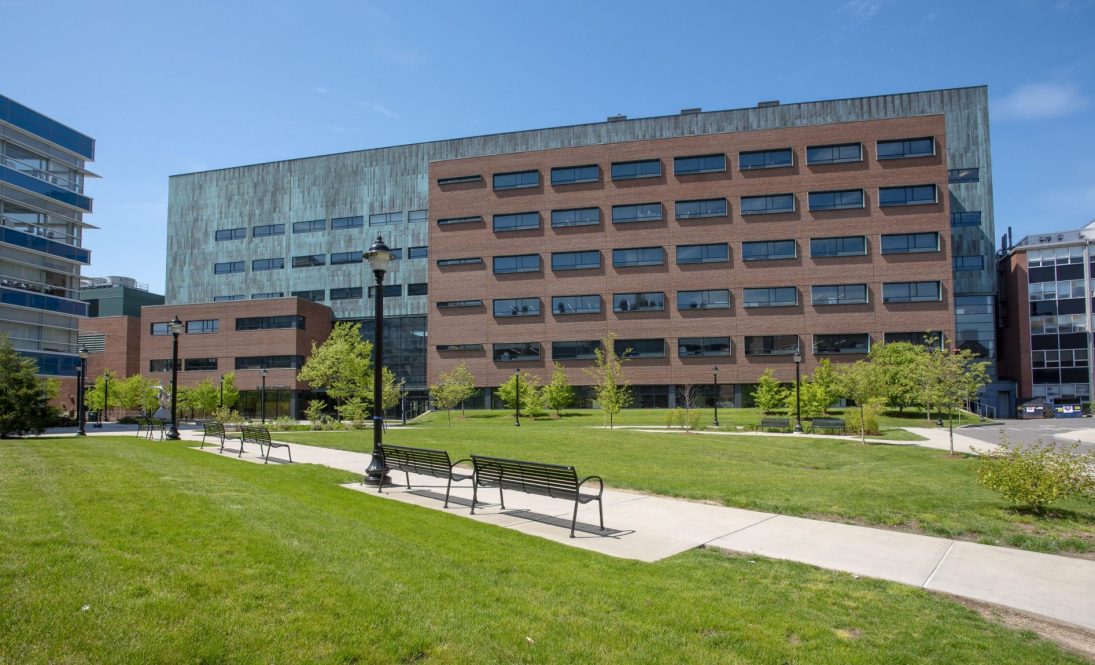While many students have dispersed away from campus for the summer, members of the Sartor Lab have stayed to continue their research studies, leading to recognition and funding by both renowned research institutions and the university.
The Sartor Lab primarily studies the role of epigenetics in substance use disorders (SUD) and addiction behavior, investigating both mechanistic pathways of the disease as well as potential pharmacotherapies for opioid use disorder (OUD) and opioid withdrawal symptoms.
“The summer research programs provide students with invaluable opportunities to delve deeply into a project, as there are no classes and few meetings to interfere with the experiments,” Sartor highlights.
Seyednejad, a second year pharmacology and toxicology Ph.D. student, was awarded the Institute for the Brain and Cognitive Sciences (IBACS) Graduate Summer Fellowship. This award is offered to UConn graduate students who contribute to projects related to brain and cognitive science research.

Bottom: Cruceta Ramirez (left), Silveira, Patel (right)
Seyednejad’s work studies the epitranscriptomic mechanisms that underly cocaine use disorder. Specifically, he is focusing on identifying substance-induced post-transcriptional changes to RNA using a novel mass spectrometry based approach. He hopes that his work can be used to shed light on the understudied field of epitranscriptomic modifications and their contribution to the addiction phenotype, as well as to pave the way for identifying novel therapeutic targets for the treatment of cocaine use disorder.
Before his studies here at UConn School of Pharmacy, Seyednejad received a Pharm.D. from Tehran University of Medical Sciences in Iran. He has had a handful of peer reviewed publications in the field of pharmacology and toxicology and has presented on his work at numerous conferences and symposiums. Seyednejad is a representative of the UConn School of Pharmacy Dean’s Student Liaison Committee and a mentor for undergraduate researchers in the Sartor Lab as well.
Lehane, a second year pharmacology and toxicology Ph.D. student, was also awarded the IBACS Graduate Summer Fellowship. Lehane’s project investigates the potential for (2R,6R)-Hydroxynorketamine (HNK) as a novel pharmacotherapy for the treatment of OUD. The Sartor Lab has previously identified HNK as an effective agent for alleviating opioid withdrawal symptoms, and Lehane’s current project is aimed at further investigating the specific mechanisms involved in HNK therapy.
Before starting his graduate studies, Lehane received a Bachelor of Science in physiology and neurobiology from the UConn College of Liberal Arts and Sciences with a minor in psychological science. During that time, Lehane assisted in behavioral neuroscience research in which he acquired skills in both addiction behavior research and behavioral genetic testing. Upon entering the School of Pharmacy, Lehane has contributed as a teaching assistant for multiple courses, and he was selected for a pre-doctoral fellowship in 2023.
Cruceta Ramirez, a Pharm.D. student, was awarded a Summer Undergraduate Research Fund (SURF) award by the UConn Office of Undergraduate Research, which financially allows students to continue engaging in research projects during the summer months. Cruceta Ramirez also contributes to the HNK research project, specifically focusing on the functional effects of HNK within the hippocampus of mice brains during opioid withdrawal.
Previously, Cruceta Ramirez has also been awarded as a McNair Research Scholar and a CAPS Research Scholar at UConn. In addition to her research endeavors, Cruceta Ramirez serves as an active member of the School of Pharmacy Diversity Committee, the Student Pediatric Pharmacy Advocacy Group (SPPAG), the Dominican Student Association (DSA), and the First Gen Society.
Silveira, a junior pathobiology student, was named a McNair Research Scholar and CAPS Research Scholar at UConn for his additional contributions to the HNK project in the Sartor Lab. Silveira’s research specifically examines the effects of HNK on neuroinflammation in opioid addiction using animal models, which could also pave the way for further research investigating HNK use in other neuroinflammatory diseases such as Alzheimer’s or depression.
Outside of his research, Silveira has been dedicated to giving back to his community, both locally and internationally. Last summer, Silveira served as a UConn Medical Brigade Volunteer in Athens, Greece, where he focused on providing accessible health care to locals. Closer to home, Silveira serves as the treasurer of the UConn Brazilian Student Association (BraSA), an academic engagement mentor for La Comunidad Intelectual Learning Community, and a Mentoring, Educating, and Transforming to Achieve Success (METAS) peer mentor for the UConn Puerto Rican/Latin American Cultural Center. Silveira also participates in intramural soccer at UConn.
Vaglivelo, a fourth year Pharm.D. Candidate, was awarded the American Foundation for Pharmaceutical Education (AFPE) Gateway to Research Award for his research investigating the behavioral effects of adulterant fentanyl and xylazine in animal models, as well as the efficacy of alpha-2 agonists clonidine and lofexidine in the treatment of OUD and opioid withdrawal. A recent UConn Today story captures more extensive details of the award and Vaglivelo’s accomplishments.
Patel, a junior neuroscience student at Bowdoin College in Maine, was awarded under the Research Experience for Undergraduates (REU) Program by the National Science Foundation. This program, intended for undergraduate students who are interested in learning more about a Ph.D. program, allows students to apply for research positions at other universities with more extensive research programs and funding than their home institution. Patel wanted to work in the Sartor Lab because of her interest in behavioral epigenetics, which parallels some of the work she has done at Bowdoin College.
Nonetheless, Patel’s work certainly deviates from the lab’s typical focuses of OUD and addiction; she is investigating a potential link between HNK and the treatment of glioblastoma, a brain and spine cancer. The Sartor Lab does not specialize in cancer research, so Patel has worked throughout the summer to establish this kind of work within the lab, which she mentions has been a learning moment for everyone. She hopes that this work, while it is likely a standalone project in the lab, will help guide further research as the lab investigates how HNK works.
“I am thrilled to work with so many bright and motivated students,” says Sartor. “They bring much enthusiasm and fresh perspectives to our research projects.”



